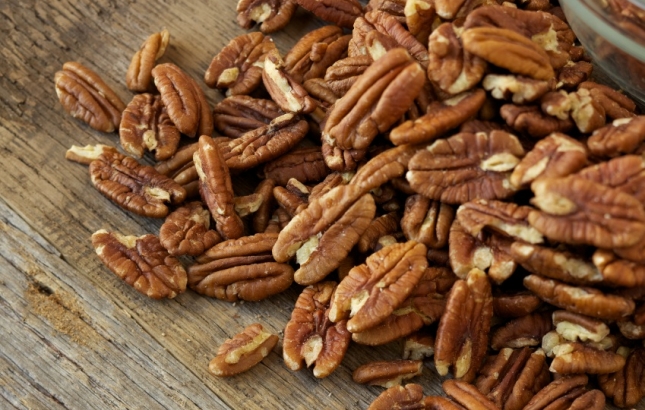
Why Soak Your Nuts and Seeds
Nuts and seeds are undeniably little powerhouses, packed with essential fats, fiber, vitamins and minerals that are vital to our health. They’re pretty virtuous wee guys, right? Well, yes, nuts (and seeds) are awesome but cracking into their full nutritional goodness isn’t quite as easy as munching on a handful of roasted almonds. We have to actually trick Mother Nature into handing it over.
Nuts and seeds are undeniably little powerhouses, packed with essential fats, fiber, vitamins and minerals that are vital to our health. They’re pretty virtuous wee guys, right? Well, yes, nuts (and seeds) are awesome but cracking into their full nutritional goodness isn’t quite as easy as munching on a handful of roasted almonds. We have to actually trick Mother Nature into handing it over.
Recent posts by Renée Leonard-Stainton
Have you ever randomly pondered why those pumpkin seeds you’ve squirreled away at the back of your pantry just never turn moldy or don’t eventually just turn outright pumpkin on you? You see, Nature is thoughtful, and has gifted nuts and seeds a special enzyme that inhibits their growth until it has all the things it needs to grow (sunlight, water, soil etc.) When it rains, the nut or seed gets wet and can then germinate to produce a plant. Basic science, I know, so how exactly does this relate to our consumption of the beloved nuts and seeds?
When we eat raw nuts and seeds, we also eat the enzyme inhibitors that prevent the seed from sprouting. This outer coating is a problem for us because it is made up of nutritional enzyme inhibitors and toxic substances. These enzymes inhibitors bind to our own enzymes and prevent them doing what they’re meant to do. When it comes to our absorption of nutrients, I’m going to break it down simply and just broadly refer to these as ‘digestive enzymes’ and ‘metabolic enzymes’. Digestive enzymes help break down food and metabolic enzymes help every biological process the body does. Consuming those tough little enzyme inhibitors puts a strain on our digestive system, since they will prevent our own enzymes from breaking down the food in our digestive tracts, inhibiting absorption of precious vitamins and minerals.
Luckily, Mother Nature evened the playing field by giving us humans the intelligence to find a way around this dilemma. Simply by soaking nuts and seeds in a little warm water and salt (salt helps activate beneficial enzymes that de-activate the enzyme inhibitors), you release these toxic enzyme inhibitors and unlock the full vitality contained within the nuts and seeds.
How to Soak your Nuts and Seeds
Many nuts, especially walnuts and almonds, actually taste better after they are soaked and rinsed, losing their bitterness associated with residues and tannins on their skins.
- Pour enough purified water over nuts or seeds to cover, and add ¼ teaspoon of salt.
- Leave, covered, at room temperature for 4 hours (macadamias or cashews) or 12 hours (all other nuts and seeds).
- Drain in a colander. Rinse your nuts and seeds well. Never re-use the water that the nuts have been soaking in.
- Use immediately (eg. for nut butters, baking etc) or store in an airtight container in the fridge for up to 3 days.
If Dehydrating/Roasting your Nuts or Seeds:
- Nut purists would usually slowly-dry the nuts in a dehydrator or oven on the lowest possible setting for 24 hours to remove all moisture.
- I very rarely have time for this so I spread them onto a baking tray and place them in an oven on a low temperature and lightly roast them for about 1 hour. While heating can damage or destroys some of those good enzymes, you’re better off having slightly toasted nuts than un-soaked with ‘un-accessible’ nutrients!
If your recipe calls for soaked nuts or seeds and you are low on time, try to squeeze in 20 minutes or just do a really good job rinsing them. Otherwise, plan ahead a bit and soak them overnight in your refrigerator in a glass container with an airtight lid.
Live well, live long, live naturally
Renée x




Really enjoying your blog Renee, and am learning a lot from your interesting articles. Thank you! Amber x
Thanks Amber! So happy you're finding the articles useful! Thanks for your support x
What about linseeds and chia seeds? I soak them in hot water then eat them with the gel that they produce. Should I be rinsing them first?
Hi Safia. Yes, you should rinse your chia first and then soak them for about 15 minutes. I actually wasn't sure about the details around eating the soaking water with chia seeds specifically, so I have done some reseach and spoken to a few chia seed suppliers. They say that they are an exception and can just be rinsed and their soft shell is easilt digestable and the nutrients readily available if they have been rinsed and soaked. Linseeds should ideally be rinsed thoroughly and then soaked overnight, and then any excess water drained off before eating. I hope this helps! x
Good read! Adding to it I think I have often seen people eating anything when they are hungry. We should not kill the hunger but should actually feed it with mindful eating in form of soaked nuts. Nothing can help you more than that :)
Thanks Michael! Agree, soaking nuts and seeds is a very important part of a healthy diet :) Cheers for your input :)
My pleasure :)